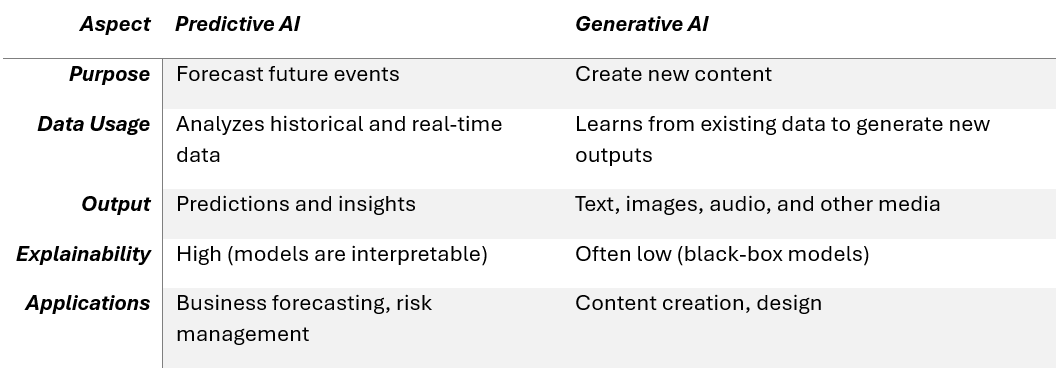Berlin, 06/16/2025
The landscape of artificial intelligence growth and development is presenting organizations with diverse options and tools to apply to their industries. A fundamental question emerges: How do you select the appropriate AI technology to drive measurable business outcomes?
Both technically and strategically, this question has two main alternatives, Predictive AI and Generative AI, which can impact our operational efficiency, market positioning, and bottom-line performance in different ways. It is essential to align the implementation of AI tools and systems with specific business objectives to ensure a return on investment and concrete outcomes.
AI Decision Framework
Successful AI implementation comes from systematic problem identification and categorisation, followed by appropriate technology selection. This framework focuses on choosing between Generative AI and Predictive AI based on the nature of the business challenge.
Generative AI Applications
- Creative asset streamlined production (images, text, video)
- Code generation for development acceleration
- Customer service automation and conversational interfaces
- Content personalisation and marketing copy generation
- Documentation and report creation
Key characteristic: These problems involve generating novel outputs based on learned patterns from training data.
Predictive AI Applications
- Customer behaviour prediction and churn analysis
- Risk assessment and fraud detection
- Financial planning and revenue projections
- Demand forecasting, inventory management, and optimisation
- Market trend analysis and strategic planning
Key characteristic: These problems involve analysing historical patterns to predict future outcomes or trends to enable, for example, proactive decision making.
However, let us break down the terminology first:
- Generative AI refers to models trained on massive amounts of raw data to generate original content based on a prompt, such as images, audio, code, text, or video (IBM, 2024).
- Predictive AI instead blends statistical analysis with machine learning algorithms to find patterns and forecast future outcomes, commonly used for business decision-making (IBM, 2024).
Comparative Overview

Overview comparison between Predictive AI vs. Generative AI
Implementation Considerations
When selecting between Generative and Predictive AI, also evaluate:
- Data availability and quality
- Accuracy requirements
- Interpretability needs
- Real-time vs. batch processing
- Integration complexity
Predictive AI: The Strategic Advantage in Customer Intelligence
Customer retention exemplifies where Predictive AI delivers an important competitive advantage. Traditional customer analytics operate reactively, by analysing historical data to understand past behaviours after business impact has already occurred.
Conventional approach limitations:
- Analysis occurs after the customer's decision to churn is made
- Insights reflect historical patterns rather than predictive indicators
- Intervention strategies target broad customer segments without precision or customization
- Resource allocation lacks strategic prioritization
Predictive AI transformation:
- Capability of identifying at-risk customers 30-90 days before churn happens
- Delivers customer-specific probability scores for targeted actions
- Enables proactive retention strategies during persuadable timings
- Optimizes resource allocation based on predicted outcomes
Some studies implementing advanced predictive analytics have achieved churn prediction accuracy rates exceeding 95% (Wagh, et al., 2023), (Asif, Shoaib, & Mukheimer, 2025), representing substantial improvement over traditional methodologies. It is important to note that these results typically represent controlled research environments and may vary significantly by industry and implementation quality.
Additionally, leading consulting firms report that top-performing e-commerce companies leveraging AI-driven personalization can achieve revenue increases of up to 40% compared to traditional approaches (Arora, et al., 2021). These figures represent best-case scenarios achieved by industry leaders with optimal implementation.
Which AI Solution is Right for Your Business?
The choice between Predictive and Generative AI depends on your organization's objectives:
Opt for Generative AI if you aim to automate creative processes, such as content generation, design tasks or customer communication (Lawton, 2024).
Choose Predictive AI if your goal is to enhance decision-making, forecast trends, or manage risks. Its strength lies in providing actionable insights based on data analysis (Lawton, 2024).
It's worth noting that these technologies can complement each other in sophisticated implementations. For instance, Generative AI can create synthetic data to train Predictive AI models to enhance their accuracy and robustness. On the other hand, Predictive AI can inform Generative AI outputs with data-driven insights, enhancing overall system accuracy and business relevance.
Backwell Tech's Focus: Predictive AI Expertise
Our commitment to Predictive AI solutions derives from our research efforts and our proven business impact. While market attention is currently focused on generative AI’s powers and capabilities, predictive intelligence drives a measurable improvement.
Backwell Tech’s differentiated approach delivers:
- Explainable AI Architecture: Every prediction includes the transparent reasoning behind it, which enables confident decision-making and regulatory compliance
- Adaptive Learning Systems: Models continuously improve and adjust to each industry need and market, maintaining accuracy over time
- Enterprise Integration: Solutions designed for enterprise-scale deployment with existing business systems and workflows
- Measurable ROI: Direct correlation between predictive insights and business outcomes, customer retention rates, revenue optimization, and operational efficiency gains
AI’s Value: Answering Business Needs
The strategic value of AI lies not in adopting the most advanced technology, but in selecting the appropriate technology for specific business challenges. Predictive AI excels in forecasting customer behaviour, optimizing operations, and enabling proactive decision-making. Generative AI serves content creation and automation requirements.
For organizations seeking competitive advantage through customer intelligence, predictive analytics delivers measurable outcomes that directly impact retention rates, lifetime value optimization, and market positioning.
The strategic imperative is clear: Organizations must align AI capabilities with business objectives to achieve sustainable competitive advantage.
About Backwell Tech
Backwell Tech is a Berlin-based high-tech company specializing in predictive AI solutions. The platform offers companies scalable AI models for profit maximization by utilizing historical and real-time data and ensuring data integrity. Since its founding in 2019, Backwell Tech has combined cutting-edge research with practical innovation in explainable algorithms. The company focuses on ethical AI development and delivers reliable, interpretable forecasts that enable informed business decisions. More information at www.backwelltechcorp.com.
Backwell Tech Corp contact:
Maximilian Gismondi
hello@backwelltechcorp.com
Sources:
- Arora, N., Ensslen, D., Fiedler, L., Liu, W., Robinson, K., Stein, E., & Schueler, G. (2021). The value of getting personalization right-or wrong-is multiplying. Retrieved from McKinsey & Company: https://www.mckinsey.com/capabilities/growth-marketing-and-sales/our-insights/the-value-of-getting-personalization-right-or-wrong-is-multiplying
- Asif, D., Shoaib, M., & Mukheimer, A. (2025). A data-driven approach with explainable artificial intelligence for customer churn prediction in the telecommunications industry. Retrieved from ScienceDirect: https://doi.org/10.1016/j.rineng.2025.104629
- IBM. (2024). Generative AI vs. Predictive AI: What's the difference? Retrieved from IBM Think : https://www.ibm.com/think/topics/generative-ai-vs-predictive-ai-whats-the-difference
- Lawton, G. (2024). Search Enterprise AI. Retrieved from TechTarget: https://www.techtarget.com/searchenterpriseai/tip/Generative-AI-vs-predictive-AI-Understanding-the-differences
- Wagh, S., Andhale, A., Wagh, K., Pansare, J., Ambadekar, S., & Gawande, S. (2023). Customer churn prediction in telecom sector using machine learning techniques. Retrieved from ScienceDirect: https://doi.org/10.1016/j.rico.2023.100342






